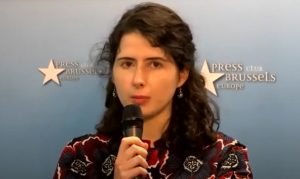Index relies entirely on the support of donors and readers to do its work.
Help us keep amplifying censored voices today.
The summer issue of Index magazine concentrated its efforts on the developing situation between Russia and Ukraine and consequential effects around Europe and the world.
We decided to give voice to journalists, artists and dissidents who chose to respond to this ruthless war. At the same time, we didn’t forget other attacks on freedoms that haven’t been covered around the globe as much as they should.[/vc_column_text][vc_custom_heading text=”Up front”][vc_column_text]Joining Ukraine’s battle for freedom, by Jemimah Steinfeld: We must stand with the bold and brave against Putin.
The Index: A global tour of free expression, departing from the poll booth and arriving at the journalists reporting under Taliban rule.[/vc_column_text][vc_custom_heading text=”Features”][vc_column_text]Fifty years of pride and prejudice, by Peter Tatchell: Following the rise and
corporate fall of London’s march for LGBT rights, will grassroots voices rise again?
India’s meaty issue, by Aishwarya Jagani: When a burger comes with a side of oppression.
Cartoon, by Ben Jennings: Art imitates life, caveman style.
My three years of hell in an Uyghur ‘re-education’ camp, by Gulbahar Hatiwaj and Rahima Mahmut: As the world stays silent, hear the truth from inside China’s brutal concentration camps.
One step ahead of the game, by Chen Dan: Media criticism of the Chinese government is all part of the power play.
Welcome to the kingdom of impunity, by Michael Deibert: The landscape is dangerous for journalists in Haiti. Murders and kidnappings are a daily risk.
Politically corrected? By Issa Sikiti da Silva: The banned words the Kenyan
government doesn’t want to hear in this election year.[/vc_column_text][vc_custom_heading text=”Special report: The battle for Ukraine”][vc_column_text]Losing battle for truth in Russian lecture halls, by Ilya Matveev: The war has put a new strain on academic freedom. A Russian lecturer laments his lost classroom.
Don’t be afraid to say two plus two is four, by Mark Frary and Alla Gutnikova: As a convicted student journalist speaks out for freedom, do Russian dissidents once again face the gulag?
Emotional baggage, by Slavenka Drakulic: How it feels to pack up a life in Ukraine and become a refugee.
Back to the future, by Martin Bright: The world has been turned
upside down for Ukrainian reporters, and this is their new landscape.
On not being shot, by John Sweeney: Amidst the Kremlin-wrought
wreckage, do we need a new era of journalism?
Russia’s trojan horse moves closer to Europe, by Viktória Serdult: In Hungary, Putin’s right-hand man and Europe’s right-wing firebrand wins again.
Turkey’s newfound russophilia, by Kaya Genç: Putinism is seeping into Turkey, and it spells trouble for future freedoms.
Divided by age and a tv screen, by Hanna Komar: How do you make sure your
family see the truth when they’re blinded by Kremlin propaganda? A Belarus activist speaks out.
Culture in the cross hairs, by Andrey Kurkov: Decades after Soviet rule, Ukrainian culture is once again under threat, as are the lives behind the creative expression.
Bordering on media control, by Kseniya Tarasevich: False information about
Ukraine finds fertile breeding ground in Poland.
Treat tragedies of the Ukraine war with dignity, by Olesya Khromeychuk: The grieving hearts left behind when death becomes news fodder.
Worth a gamble, by Jemimah Steinfeld: When telling the truth is a crime, turn to a criminal spam operation.[/vc_column_text][vc_custom_heading text=”Comment”][vc_column_text]
Cancel Putin, not culture, by Maria Sorenson: Banning Russian artists assumes
that they are all collaborators of the Russian state and goes against artistic freedoms.
Beware the ‘civilisation’ battle, by Emily Couch: Why Europe must reject
anti-Asian racism to fully stand with Ukraine.
The silent minority, by Ruth Smeeth: A tribute to those whose work never saw the light of day.[/vc_column_text][vc_custom_heading text=”Culture”][vc_column_text]‘The light is no longer the light it used to be’, by Lyuba Yakimchuk: The poet on children being indoctrinated and the elderly disorientated in Russia-occupied Ukraine.
A cassandra worth heeding, by Dominic Cavendish: Murdered Russian journalist
Anna Politkovskaya, whose dispatches from Chechnya should be put in the spotlight.
Poetic injustice, by Stephen Komarnyckyj: History is repeating itself
on the pages penned by Ukrainian writers.
Banking on Russia’s poetic spirit, by Maria Bloshteyn and Yulia Fridman: A “piggy bank” of Russian poetry is fighting on the right side of Putin’s war.
Metaphors and madness, by Eduardo Halfon: In Guatemala, truth is best expressed through fiction.
Metal shows its mettle, by Guilherme Osinski: A heavy metal band labelled
“satanic” by Iran is free from prison and taking back the microphone.
America’s coming crucible, by Jo-Ann Mort: Women in the USA might soon be in the dark about their own bodies.
Join Index on Censorship and Pushkin House for a night discussing freedom of expression in Russia as part of the launch of the latest issue of Index on Censorship magazine.
The 2022 summer magazine looks at how the Russian invasion in Ukraine impacts freedoms within Ukraine and across Europe, Turkey and Russia. While the pages are filled with stories of brave and brilliant people speaking up and out, many write on the growing challenges for freedom of expression. This is especially the case for those living in Russia under Vladimir Putin. This will be the topic of our discussion for the launch.
Featuring a panel of people with direct experience and knowledge of Russia under Putin, the evening will address how much freedom there is in Russia right now, particularly in relation to media freedom and protest.
The panel will include Russian investigative journalists Andrei Soldatov and Irina Borogan, as well as Ben Noble, Associate Professor in Russian Politics at University College London. The conversation will be chaired by Index on Censorship magazine Editor-In-Chief Jemimah Steinfeld. The event will also include a reading of a passage written by the late Russian journalist Anna Politkovskaya, who was murdered in Moscow in 2006.
A wine reception will follow.
This event is free, but seats are limited. Advanced booking is essential. Register for your ticket here.
MEET THE SPEAKERS
 Andrei Soldatov is a Russian investigative journalist, co-founder, and editor of Agentura.ru, a watchdog of the Russian secret services’ activities.
Andrei Soldatov is a Russian investigative journalist, co-founder, and editor of Agentura.ru, a watchdog of the Russian secret services’ activities.
He is co-author with Irina Borogan of The New Nobility. The Restoration of Russia’s Security State and the Enduring Legacy of the KGB (PublicAffairs, 2010), The Red Web: The Struggle Between Russia’s Digital Dictators and the New Online Revolutionaries (PublicAffairs, 2015) and The Compatriots: The Brutal and Chaotic History of Russia’s Exiles, Émigrés, and Agents Abroad (PublicAffairs, 2019).
 Irina Borogan is a Russian investigative journalist, co-founder and deputy editor of Agentura.ru, a watchdog of the Russian secret services’ activities. She chronicled the Kremlin’s campaign to gain control of civil society and strengthen the government’s police services under the pretext of fighting extremism.
Irina Borogan is a Russian investigative journalist, co-founder and deputy editor of Agentura.ru, a watchdog of the Russian secret services’ activities. She chronicled the Kremlin’s campaign to gain control of civil society and strengthen the government’s police services under the pretext of fighting extremism.
She is co-author with Andrei Soldatov of The New Nobility. The Restoration of Russia’s Security State and the Enduring Legacy of the KGB (PublicAffairs, 2010), The Red Web: The Struggle Between Russia’s Digital Dictators and the New Online Revolutionaries (PublicAffairs, 2015) and The Compatriots: The Brutal and Chaotic History of Russia’s Exiles, Émigrés, and Agents Abroad (PublicAffairs, 2019).
 Dr Ben Noble is Associate Professor of Russian Politics at University College London (UCL SSEES) and an Associate Fellow of Chatham House. His research focuses on legislative politics, authoritarianism, and Russian domestic politics, with awards from The Leverhulme Trust, the Political Studies Association, and the British Academy. His co-authored book Navalny: Putin’s Nemesis, Russia’s Future? (Hurst and Oxford University Press, 2021) has so far been translated into eight languages, was selected by the Financial Times as one of the best books on politics in 2021, and has been shortlisted for the Pushkin House Book Prize in 2022. Ben frequently provides commentary and analysis on Russian politics for academic, policy, media, and general audiences.
Dr Ben Noble is Associate Professor of Russian Politics at University College London (UCL SSEES) and an Associate Fellow of Chatham House. His research focuses on legislative politics, authoritarianism, and Russian domestic politics, with awards from The Leverhulme Trust, the Political Studies Association, and the British Academy. His co-authored book Navalny: Putin’s Nemesis, Russia’s Future? (Hurst and Oxford University Press, 2021) has so far been translated into eight languages, was selected by the Financial Times as one of the best books on politics in 2021, and has been shortlisted for the Pushkin House Book Prize in 2022. Ben frequently provides commentary and analysis on Russian politics for academic, policy, media, and general audiences.
 Jemimah Steinfeld is the editor-in-chief at Index on Censorship. Prior to Index she lived in China. She is the author of the book Little Emperors and Material Girls: Sex and Youth in Modern China, and has written for a variety of publications, including The Guardian, The Telegraph, The Independent, CNN, New Statesman and openDemocracy. She can be found tweeting @JFSteinfeld.
Jemimah Steinfeld is the editor-in-chief at Index on Censorship. Prior to Index she lived in China. She is the author of the book Little Emperors and Material Girls: Sex and Youth in Modern China, and has written for a variety of publications, including The Guardian, The Telegraph, The Independent, CNN, New Statesman and openDemocracy. She can be found tweeting @JFSteinfeld.
Physical attacks on journalists have increased dramatically over the past year, according to the latest annual report from the Council of Europe Platform on media freedom in Europe.
The platform, of which Index on Censorship is a partner, reports on serious threats to the safety of journalists and media freedom in Europe in order to reinforce the Council of Europe’s response to the threats and member states’ accountability.
The new report, Defending Press Freedom in Times of Tension and Conflict, reveals that the number of cases involving the safety and physical integrity of journalists has jumped by 51% year-on-year, with 82 cases reported to the platform.
Many of the attacks on journalists have taken place during public protests.
“Violence against journalists during street protests is fed by a wave of media bashing and an avalanche of hate speech on social networks – very often prompted by political figures – which directly target journalists, questioning their independence and legitimacy and therefore making them more vulnerable to physical aggression,” the report says.
Overall, the number of alerts in all categories published by the CoE platform has sky-rocketed to 280 in 2021, up from around 200 in 2020 and more than double the level reported in 2016. Of the 280 alerts, 110 related to the harassment and intimidation of journalists.

Index’s policy and campaigns manager Jessica Ní Mhainín
Speaking at the launch of the report, Index’s policy and campaigns manager Jessica Ní Mhainín highlighted cases of impunity in CoE’s report.
“Impunity for crimes against journalists refer to failure of states to identify, prosecute and punish anyone including the assailants and masterminds involved in committing a crime against a journalist,” she said. “Cultures of impunity contribute to self-censorship by making journalists more vulnerable to pressures out of fear of reprisals or harm.”
Some 35 cases of impunity have been registered on the platform since 2015 and two new impunity cases – those of Turkish journalist Uğur Mumcu, murdered in 1993, and Turkish-Cypriot journalist Kutlu Adalı, murdered in Cyprus in 1996 – were added to the impunity category during the year.
“In 2021, we welcomed the Slovak Supreme Court’s decision to overturn the not-guilty verdicts of the suspected masterminds of the 2018 murder of journalist Ján Kuciak and his fiancée Martina Kušnírová. The case will be heard in the Specialized Criminal Court later this year,” said Ní Mhainín.
Last year also saw the publication of a 438 page-report from the public inquiry into the assassination of investigative journalist Daphne Caruana Galizia, which concluded that the state of Malta “must bear responsibility for the assassination because it created an atmosphere of impunity”.
“We once again call on the Maltese authorities and the Commission of Experts to implement the recommendations of the Public Inquiry,” said Ní Mhainín.
Russia, Turkey and Ukraine account for 60% of all the cases relating to impunity on the platform. Last October marked the 15th anniversary of Russian journalist Anna Politkovskaya’s murder.
Ní Mhainín said, “The masterminds of her murder are still at large, sending the incredibly dangerous message that killing a journalist is a low-risk crime.”
Yet impunity is not restricted to these countries.
A BBC Spotlight investigation has uncovered serious concerns over the police investigation and the failure to prosecute those behind the murder of Irish journalist Martin O’Hagan, who was killed in September 2001 for his reporting on paramilitary activities in Northern Ireland. The concerns raised in the programme, which aired on 2 March 2022, came in the wake of several Police Ombudsman reports that uncovered collusive behaviour between the police and loyalists in Northern Ireland. According to the BBC’s investigation, police did not act on important information – including individual names – that were handed over to them within 48 hours of the murder. The journalist’s family are now taking legal action against the Police Service of Northern Ireland (PSNI) and the Ministry of Defence.
“Press freedom is the canary in the coal mine – it is a key indicator of the clear and worrying degree of democratic backsliding that is taking place across Europe,” said Ní Mhainín. “That’s why we once again call on Council of Europe member states to ensure that the highest priority is given to conducting thorough and transparent investigations into all crimes against journalists and we remind member states of the 2016 Recommendation of the Committee of Ministers which requires states ‘adopt appropriate criminal law provisions to prevent impunity’”
The spring issue of Index magazine is special. We are celebrating 50 years of history and to such a milestone we’ve decided to look back at the thorny path that brought us here.
Editors from our five decades of life have accepted our invitation to think over their time at Index, while we’ve chosen pieces from important moments that truly tell our diverse and abundant trajectory.
Susan McKay has revisited an article about the contentious role of the BBC in Northern Ireland published in our first issue, and compares it to today’s reality.
Martin Bright does a brilliant job and reveals fascinating details on Index origin story, which you shouldn’t miss.
Index at 50, by Jemimah Steinfeld: How Index has lived up to Stephen Spender’s founding manifesto over five decades of the magazine.
The Index: Free expression around the world today: the inspiring voices, the people who have been imprisoned and the trends, legislation and technology which are causing concern.
“Special report: Index on Censorship at 50”][vc_column_text]Dissidents, spies and the lies that came in from the cold, by Martin Bright: The story of Index’s origins is caught up in the Cold War – and as exciting
Sound and fury at BBC ‘bias’, by Susan McKay: The way Northern Ireland is reported continues to divide, 50 years on.
How do you find 50 years of censorship, by Htein Lin: The distinguished artist from Myanmar paints a canvas exclusively for our anniversary.
Humpty Dumpty has maybe had the last word, by Sir Tom Stoppard: Identity politics has thrown up a new phenonemon, an intolerance between individuals.
The article that tore Turkey apart, by Kaya Genç: Elif Shafak and Ece Temulkuran reflect on an Index article that the nation.
Of course it’s not appropriate – it’s satire, by Natasha Joseph: The Dame Edna of South Africa on beating apartheid’s censors.
The staged suicided that haunts Brazil, by Guilherme Osinski: Vladimir Herzog was murdered in 1975. Years on his family await answers – and an apology.
Greece haunted by spectre of the past, by Tony Rigopoulos: Decades after the colonels, Greece’s media is under attack.
Ugandans still wait for life to turn sweet, by Issa Sikiti da Silva: Hopes were high after Idi Amin. Then came Museveni …People in Kampala talk about their
problems with the regime.
How much distance from Mao? By Rana Mitter: The Cultural Revolution ended; censorship did not.
Climate science is still being silenced, by Margaret Atwood: The acclaimed writer on the fiercest free speech battle of the day.
God’s gift to who? By Charlie Smith: A 2006 prediction that the internet would change China for the better has come to pass.
50 tech milestones of the past 50 years, by Mark Frary: Expert voices and a long-view of the innovations that changed the free speech landscape.
Censoring the net is not the answer, but… By Vint Cerf: One of the godfathers of the internet reflects on what went right and what went wrong.[/vc_column_text][vc_custom_heading text=”Five decades in review”][vc_column_text]An arresting start, by Michael Scammell: The first editor of Index recounts being detained in Moscow.
The clockwork show: Under the Greek colonels, being out of jail didn’t mean being free.
Two letters, by Kurt Vonnegut: His books were banned and burned.
Winning friends, making enemies, influencing people, by Philip Spender: Index found its stride in the 1980s. Governments took note.
The nurse and the poet, by Karel Kyncl: An English nurse and the first Czech ‘non-person’.
Tuning in to revolution, by Jane McIntosh: In revolutionary Latin America, radio set the rules.
‘Animal can’t dash me human rights’, by Fela Kuti: Why the king of Afrobeat scared Nigeria’s regime.
Why should music be censorable, by Yehudi Menuhin: The violinist laid down his own rules – about muzak.
The snake sheds its skin, by Judith Vidal-Hall: A post-USSR world order didn’t bring desired freedoms.
Close-up of death, by Slavenka Drakulic: We said ‘never again’ but didn’t live up to it in Bosnia. Instead we just filmed it.
Bosnia on my mind, by Salman Rushdie: Did the world look away because it was Muslims?
Laughing in Rwanda, by François Vinsot: After the genocide, laughter was the tonic.
The fatwa made publishers lose their nerve, by Jo Glanville: Long after the Rushdie aff air, Index’s editor felt the pinch.
Standing alone, by Anna Politkovskaya: Chechnya by the fearless journalist later murdered.
Fortress America, by Rubén Martínez: A report from the Mexican border in a post 9/11 USA.
Stripsearch, by Martin Rowson: The thing about the Human Rights Act …
Conspiracy of silence, by Al Weiwei: Saying the devastation of the Sichuan earthquake was partly manmade was not welcome.
To better days, by Rachael Jolley: The hope that kept the light burning during her editorship.
Plays, protests and the censor’s pencil, by Simon Callow: How Shakespeare fell foul of dictators and monarchs. Plus: Katherine E McClusky.
The enemies of those people, by Nina Khrushcheva: Khrushchev’s greatgranddaughter on growing up in the Soviet Union and her fears for the US press.
We’re not scared of these things, by Miriam Grace A Go: Trouble for Philippine
journalists.
Windows on the world, by Nazanin Zaghari-Ratcliffe and Golrokh Ebrahimi Iraee: Poems from Iran by two political prisoners.
Beijing’s fearless foe with God on his side, by Jimmy Lai: Letters from prison by the Hong Kong publisher and activist.
We should not be put up for sale, by Aishwarya Jagani: Two Muslim women in India on being ‘auctioned’ online.
Cartoon, by Ben Jennings: Liberty for who?
Amin’s awful story is much more than popcorn for the eyes, by Jemimah Steinfeld: Interview with the director of Flee, a film about an Afghan refugee’s flight and exile.
Women defy gunmen in fight for justice, by Témoris Grecko: Relatives of murdered Mexican journalist in brave campaign.
Chaos censorship, by John Sweeney: Putin’s war on truth, from the Ukraine frontline.
In defence of the unreasonable, by Ziyad Marar: The reasons behind the need
to be unreasonable.
We walk a very thin line when we report ‘us and them’, by Emily Couch: Reverting to stereotypes when reporting on non-Western countries merely aids dictators.
It’s time to put down the detached watchdog, by Fréderike Geerdink: Western newsrooms are failing to hold power to account.
A light in the dark, by Trevor Philips: Index’s Chair reflects on some of the magazine’s achievements.
Our work here is far from done, by Ruth Smeeth: Our CEO says Index will carry on fighting for the next 50 years.
In vodka veritas, by Nick Harkaway and Jemimah Steinfeld: The author talks about Anya’s Bible, his new story inspired by early Index and Moscow bars.
A ghost-written tale of love, by Ariel Dorfman and Jemimah Steinfeld: The novelist tells the editor of Index about his new short story, Mumtaz, which we publish.
‘Threats will not silence me’, by Bilal Ahmad Pandow and Madhosh Balhami: A Kashmiri poet talks about his 30 years of resistance.
A classic case of cancel culture, by Marc Nash: Remember Socrates’ downfall.